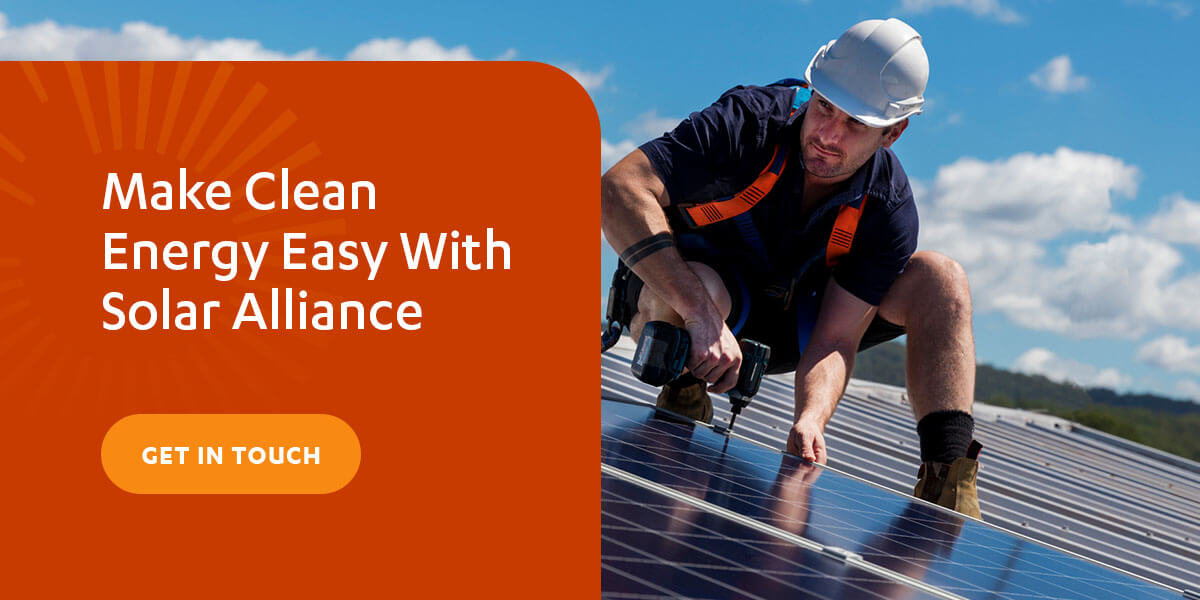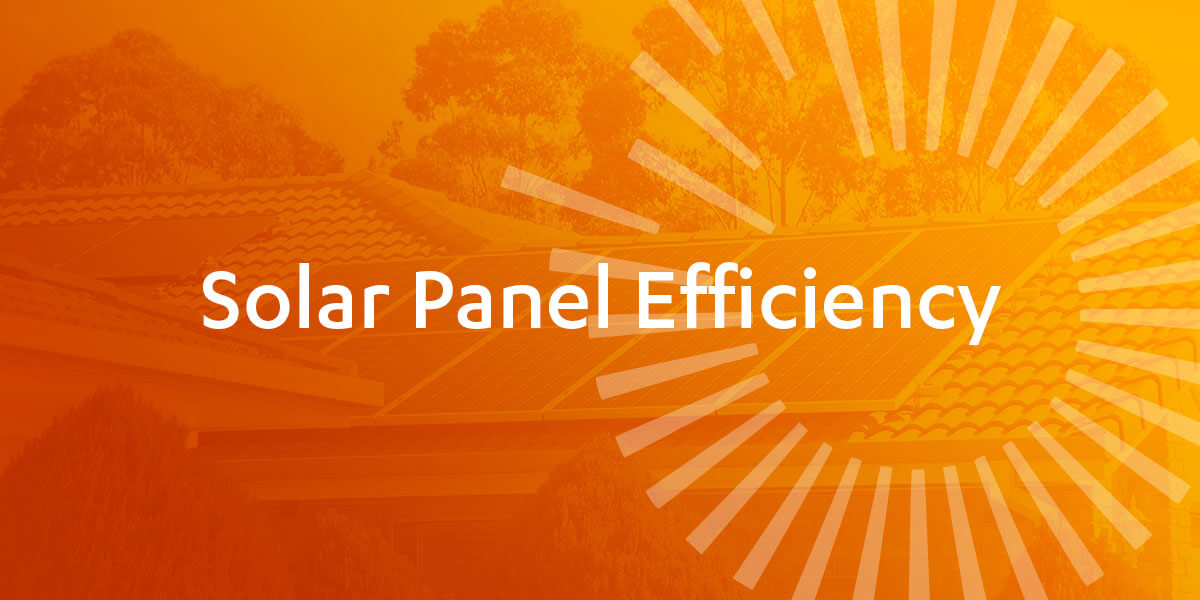
Last Updated on December 27, 2022 by Anne Brock
Interested in solar power but not sure if it will benefit you in the long run? While getting electricity from your utility company may be the traditional way of providing energy to homes and businesses, solar power is an efficient and low-cost way to provide electricity to your home or business. Over the past decade, the market for solar power has grown by 42% each year, and it’s no wonder considering solar panels last between 25-30 years. Solar power is also desirable because it uses a source of energy that is not depleting quickly, unlike fossil fuels.
We’re sure you’ve heard that solar power can benefit the environment, but how can it benefit you?
Efficiency in Different Solar Panels
You might be wondering what efficiency means in terms of solar panels. An efficient solar panel is one that can produce the most electricity possible from the sunlight that’s supplying that energy. On a larger scale, solar panels are increasing in efficiency over time. On a smaller scale, the materials a solar panel is made out of also affect its efficiency:
- Monocrystalline silicon: Energy grows at a faster rate within this solid crystal because of its barely angled corners. This means that a solar panel made primarily out of cells composed of these crystals will be able to convert the sun into usable energy with a high level of efficiency.
- Polycrystalline silicon: This kind of crystal is made out of tinier fragments of crystals. Therefore, any energy that enters this crystal would have a difficult time maneuvering around all of the tiny fragments. This suggests that a solar panel made out of cells composed of these crystals would have a more difficult time converting sun into usable energy than solar panels made out of monocrystalline silicon.
- Visible metal strips: Solar panels with visible metal strips, or busbars, are less efficient than solar panels without them. Visible metal strips work to move energy around a solar cell. However, these metal strips don’t collect the energy of the sun, so the space they might take up on a solar panel is effectively wasted. Instead of visible metal strips, some solar panels use a panel of copper to move energy around a solar cell.
Factors of Solar Panel Efficiency
Not all solar panels are made equally. There are five main factors that affect the efficiency of solar panels.
Types of Solar Panels
Two different types of solar panels offer different efficiencies:
- Photovoltaic (PV) panels: Photovoltaic panels collect the energy of the sun separate electrons. The energy that is created from this process of separation is then used to provide electricity throughout a building. Only 15%-20% of the energy collected from the sun is then converted into usable electricity. Over time, the efficiency of photovoltaic panels has increased. For example, in 1955, they were only at 2% efficiency. Their efficiency is expected to keep increasing as time presses on.
- Thermal panels: Thermal panels collect the energy of the sun directly, and they are only used to heat water. They work best in warmer climates. Around 90% of the radiation that is absorbed by a thermal panel is turned into heat, which is why thermal panels are thought of as efficient.
Age of Solar Panels
Since solar panels were invented, innovators have been working tirelessly to make them more efficient. From the materials used to the designs used, solar panels have changed a lot through the years. Even today, new materials are being tested to improve the efficiency of solar panels. For example, a material called perovskite is hoped to improve the efficiency of solar panels beyond what it is today.
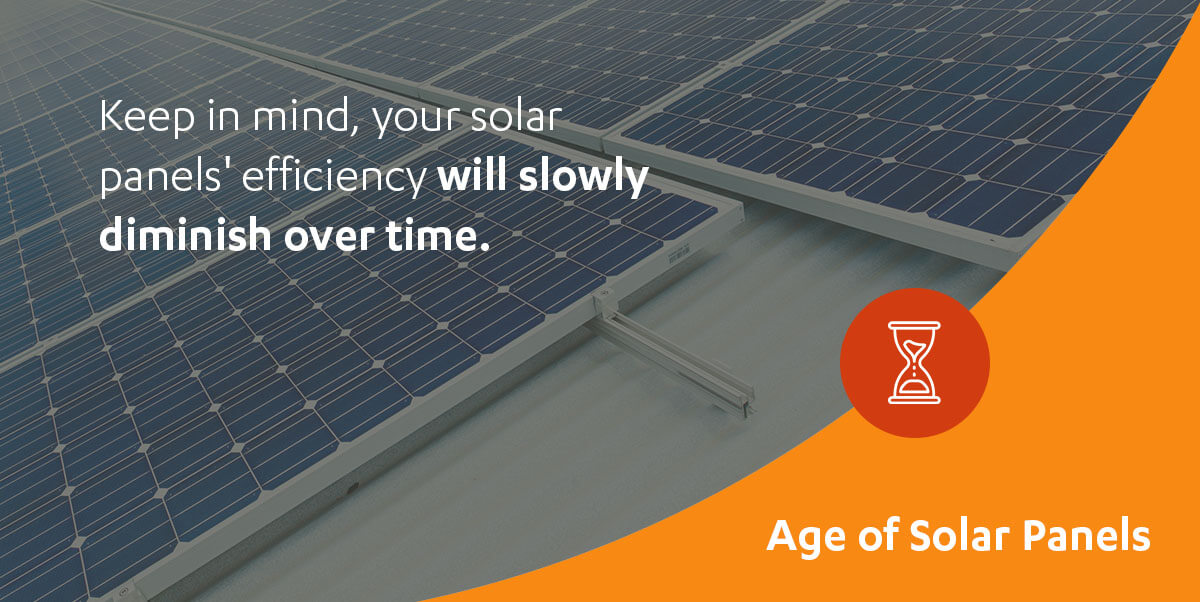
Keep in mind, your solar panels’ efficiency will slowly diminish over time. Learn more about how the particular solar panels you might be interested in age over time through your service provider.
Solar Panel System Design
Figuring out how many solar panels you need and where they should be placed to ensure their maximum efficiency can be tricky. However, as solar power becomes more widely used, there are more professionals that can help you out with your solar system design. Professionals can help you construct the solar system design that works best for you with their experience with residential buildings as well as businesses.
Sun Exposure
Solar panels work directly with the sun. So, if your house is under the cover of a lot of trees, your solar panels would provide you with less energy than the solar panels on a house that have nothing blocking them from the sun. Weather and climate are also significant factors in how much sun exposure your solar panels will get.
If the building you want to install solar panels on is in Portland, Oregon, they simply will not get as much sun exposure as they would in Yuma, Arizona. It’s also good to keep in mind that changes in the seasons will create changes in the electricity output of your solar panels.
Home Upgrades
The efficiency of the appliances in the building you want to install solar panels on will affect how efficiently your solar panels will provide electricity throughout the building. For example, older models of dishwashers, water heaters, washing machines and air conditioners tend to use more energy than newer models of these same appliances.
If your appliances use less energy overall to perform the same functions, your solar panels won’t need to supply them with as much energy. Therefore, the energy created by the solar panels would be used more sparingly and more efficiently.
Will Solar Panels Save You Money?
Although solar panels have higher costs upfront to install, in general, they can save you money in the long term. There are even solar savings estimators you can use to see the average amount of money you might save on energy costs per month depending on the area you live in and the dimensions of your roof. In some places, installing a solar system on your building might earn you a federal tax credit.
To figure out how much money you would save by installing solar panels, you would have to consider factors such as:
- How much sun exposure your roof gets
- How much space your roof has to install solar panels on
- How much electricity you use
- How much you typically pay for electricity during the different months of the year
- How inflation trends when it comes to electricity prices in your area
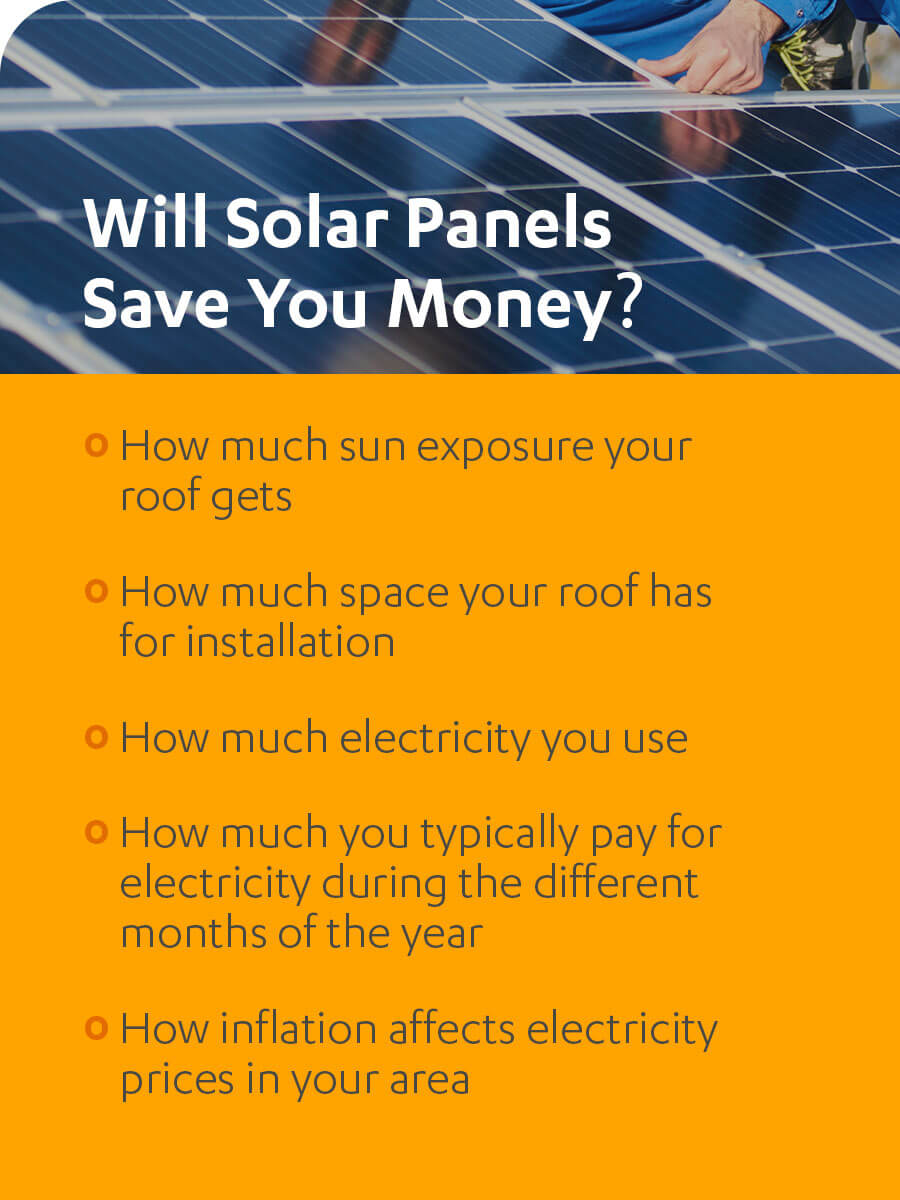
Even though you will still receive an electricity bill when you install solar panels, the cost of that electricity bill has the potential to be nothing. This is because of a policy in some states termed net metering. Net metering is when any energy that your solar panels don’t use goes to the electrical grid your building is connected to. If this happens, you would receive a credit that is calculated as a part of your bill.
For example, let’s say that your solar panels make more energy during the day than you used. You would then be able to use energy from your electrical grid even when your solar panels are not exposed to the sun. You wouldn’t be charged for this energy as long as it is as much or less than the extra energy your solar panels sent out to the grid.
From state to state, utility to utility, metering laws can vary. While net metering does not exist in Tennessee, dual metering does. This means the energy you use is on one meter and the energy you produce is on another. For homeowners and business owners in Tennessee, Solar Alliance installs batteries or under-sizes the system to avoid any metering. In Kentucky, net metering is limited to 30kW. In this case, smaller projects typically do not use battery storage. States like Illinois have a virtual metering law. This means you could generate power in a remote location and assign the power to a meter that can be used in an urban setting that may not have real estate for a larger solar system.
Due to the variety in metering laws across states and utilities, it’s important to check on your utility interconnection before thinking about solar system design and functionality. At Solar Alliance, we offer a service called Renewable RADAR, where we walk through an evaluation for every company we work with to determine what the project should look like and what will have the best return on investment.
Ask your service provider to help you calculate your solar rate of return, or in other words, the percentage of the money you invested in the solar panels that will return to you annually through savings. Once you have your rate of return established, you can calculate how many years it will take until the savings from your solar panels pay off the cost of their installment.
Solar Power vs. Utility Electric
Utility electric and solar power are both good options for providing electricity to your home or building. Solar power starts out as direct current (DC) electricity and goes through an inverter to be converted to alternating current (AC) electricity. During this conversion process, the inverter “cleans up” the energy, giving you clean and sustainable electricity. Some other general benefits of using solar power over utility electricity include:
- It saves you money in the long run.
- It can make you eligible for a tax credit.
- You won’t have to deal with utility companies increasing their prices over time.
- It’s environmentally friendly.
- It can increase the value of your property.
Efficiency
On a larger scale, when you compare the efficiency of solar power electricity and utility electricity, solar power comes out on top. Solar power that isn’t used immediately can be stored in electric grids. This reduces the amount of usable electricity going to waste.
If you live in a house with electrical appliances that are updated to be efficient, on a smaller scale, utility electricity can be efficient, as well. However, you can use those same updated appliances with solar power, which increases the efficiency of the solar power you are using.
Cost Comparison
Solar power is now considered the cheapest electricity in history, but how much would it cost to get your solar panels set up? Well, for an average-sized home in the U.S., the average cost to install a solar system ranges from $11,144-$14,696. Of course, that cost will vary with where you’re installing solar panels, how many you get, who installs them and other factors.
The average electricity bill in 2019 was $117.65 per month. When comparing this figure with the ones above, it would only take you around 10 and a half years of electricity bills until the amount you’ve paid in electricity bills starts to become greater than the highest average cost of a solar system. It’d take only about eight years until it becomes greater than the lowest average cost of a solar system. A solar system is basically a down payment on not having to pay high electricity bills for the rest of your life.
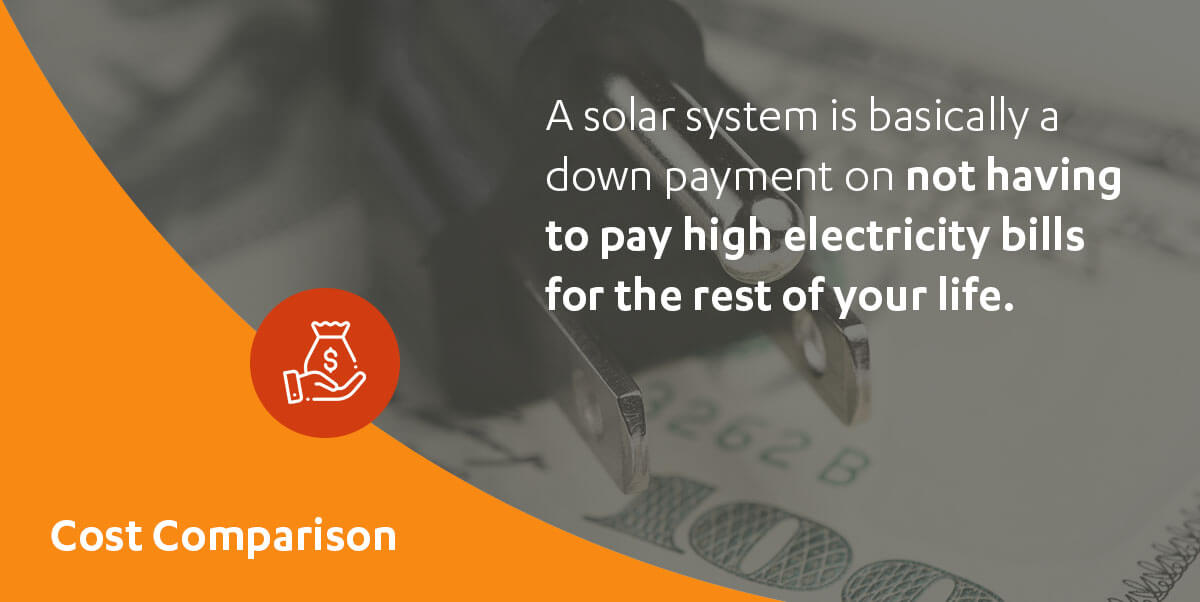
Most adults will pay electricity bills their entire life. In other words, a solar system is an investment that not only eventually pays for itself but saves your money in the long run.
How to Improve Solar Panel Efficiency and ROI
Once you get your solar panels installed, there are ways to improve your solar system’s return on investment (ROI), or the percentage of the money you invested in the solar panels that will return to you annually through savings. The following are two ways to improve your solar system’s efficiency and ROI:
Keep Your Solar Panels Clean
Your roof is exposed to the elements, so your solar panels will be, too. You want to clear away any debris that might block the sun from getting into your solar panels as often as the weather in your area dictates. For example, if you live in an area that gets a lot of wind and you have a lot of trees in your yard, you may need to clear away leaves and branches from your solar panels more often.
Solar panels are not complicated in their basic structure, so the process of cleaning your solar panels may be as simple as wiping them down a few times a year or hiring a professional to do so.
Perform Regular Maintenance
When a professional installs your solar panels, they will run you through any routine maintenance procedures that your solar panels may need. Keep in mind, you can contact the business that installed your solar panels if you have any maintenance concerns. Again, because the basic structure of solar panels is simple, any regular maintenance that will need to be performed will be simple and quick.
Make Clean Energy Easy With Solar Alliance
If you’ve considered the benefits that would come with installing solar panels — such as how much money it could save you and how efficiently it could help you use energy, and you want to move forward in getting them installed — contact Solar Alliance.
At Solar Alliance, we specialize in providing solar power to commercial buildings, residential buildings and project developments in Tennessee, Kentucky, North Carolina and South Carolina. But we’re capable of helping you with your solar power project anywhere in North America. Our solar power systems are cost-effective, require minimal maintenance and are environmentally friendly. We’re here to help you save money and install the most efficient solar system for your home or business.
If you want to learn more about the clean energy we’ve helped building owners produce, check out the case studies on our website or our testimonials.
Contact us at (865) 309-4674 for commercial solar information. You can also fill out a contact form here, and we’ll get back to you as soon as possible with any information you might request or a solar quote.

